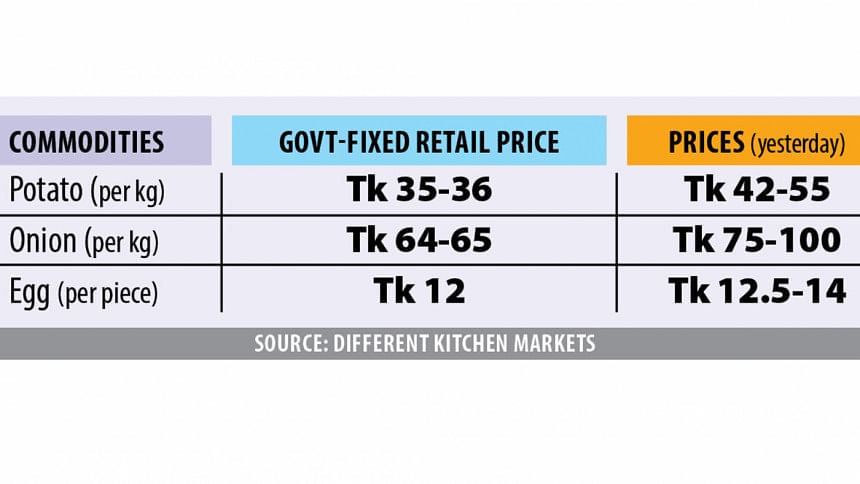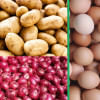3 essential commodities: Price caps prove a total failure

The government failed to enforce the price cap on onions and potatoes even for a single day since it issued the order about a month ago.
Government agencies raided kitchen markets numerous times across the country, but the retail and wholesale prices stayed way above the limit set by the agriculture ministry on September 14.
And the victims are the people of limited income already struggling to cope with the rising cost of living.
Consumer rights campaigners and economists believe capping prices never works unless supply increases according to demand.
Retailers say they cannot sell at the set prices since they are spending more to procure the goods. Wholesalers claim that they cannot lower the prices as the prices have not fallen at the sources.
The government capped the retail price of each farm brown egg at Tk 12, local varieties of onions at Tk 64-65 a kg, and potatoes at Tk 35-36 a kg.
On that day in the capital, an egg was selling for Tk 13.25, potatoes for Tk 42-55 a kg, and local onions for Tk 70-80 a kg, according to the Trading Corporation of Bangladesh data.
Yesterday, an egg was between Tk 12.50 and Tk 14, onions Tk 75 and 100 per kg, and potatoes Tk 42 and 55 a kg, this paper learned after visiting three markets in Dhaka, two in Bogura, and one each in Chattogram and Khulna.
The government had set the wholesale price of an egg at Tk 10.50, onions Tk 53-54 a kg, and potatoes Tk 26-27 a kg.
Sheikh Abdur Rashid, a retailer at Karwan Bazar, said there was no reflection of the price cap on the wholesale market. "We can only comply with the government's set prices if they [wholesalers] could sell us the items at their fixed prices."
Rashid was selling local onions and potatoes for Tk 90 and Tk 45 per kg.
He said fixing prices without increasing supply would make no impact on the market.
Egg trader Sheikh Russell in the same market yesterday said he was selling a dozen for Tk 165, or Tk 13.75 each.
He said that he was able to sell a dozen for Tk 144 – Tk 12 each – last week only because the supply improved due to imports, but his supply dropped by 30 percent yesterday and the prices went up again.
In Chattogram, an egg was selling for Tk 13-14, onions for Tk 75 a kg, and potatoes for Tk 45 per kg.
Suzit Dey, a retailer in the port city's Purbo Nasirabad area, said he was buying an egg for Tk 12 and selling for Tk 13-14. He was buying potatoes for Tk 41-42 a kg.
In Fateh Ali and Raja Bazar kitchen markets in Bogura, eggs were selling for Tk 12.50 and onions were Tk 85-95 per kg and potatoes Tk 42-45 a kg.
Al-Amin, a retailer in Fateh Ali market, said the fixed egg price would not work since the wholesale price of 100 eggs went up by Tk 50.
Abid Reza, a shopper at a market in Dhaka's Mohammadpur, said, "Setting the prices and not monitoring the kitchen market is farcical." He bought a kg of potatoes for Tk 55.
In the same market, Rizwan Ahmed, who works for a firm, said the price caps only made the commodities pricier. "There is no impact of the government's measures on the market. So, what's the point?"
The prices of essentials have been high for the last eight to nine months but no effective measures were taken. "My earnings did not increase, but all my costs continued to go up," he said.
Zahid Hussain, former lead economist at the World Bank's Dhaka office, said it was not a surprise that the essential items were not being sold at the fixed prices.
"In fact, when the government fixed the price, it was understood that it could not enforce it," he said, suggesting that the government identifies the problem first before going for solutions.
"Price caps at retail and wholesale levels won't be effective until you first find out who is the market manipulator."
"Market policing does not really work," he said, laying emphasis on making the market more competitive.
Consumers Association of Bangladesh President Ghulam Rahman said the government's price controls measure does not go with the concept of a free market economy.
"We have to ensure adequate supply and strict monitoring," he told this newspaper, adding that the government should create a formal supply chain system as the informal one has no regulation.
On October 7, Agriculture Minister Abdur Razzaque admitted that the government failed to control the prices of onions and potatoes.
An official of the commerce ministry on condition of anonymity said every year, a section of government officials inflated production figures of eggs, potatoes, and onions to please the government.

 For all latest news, follow The Daily Star's Google News channel.
For all latest news, follow The Daily Star's Google News channel. 








Comments